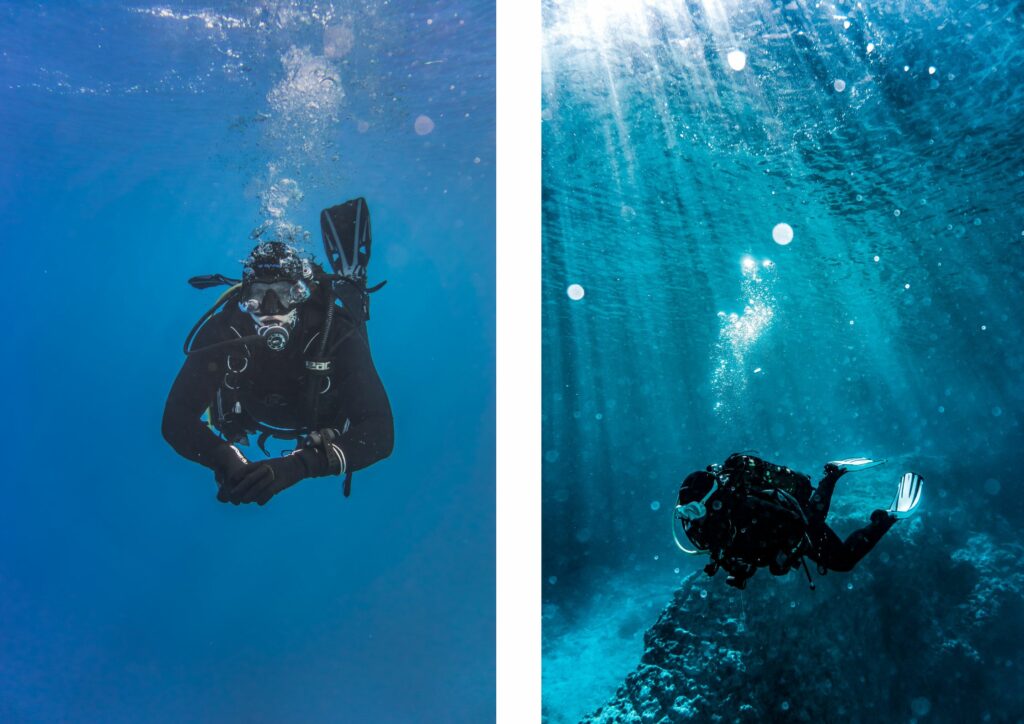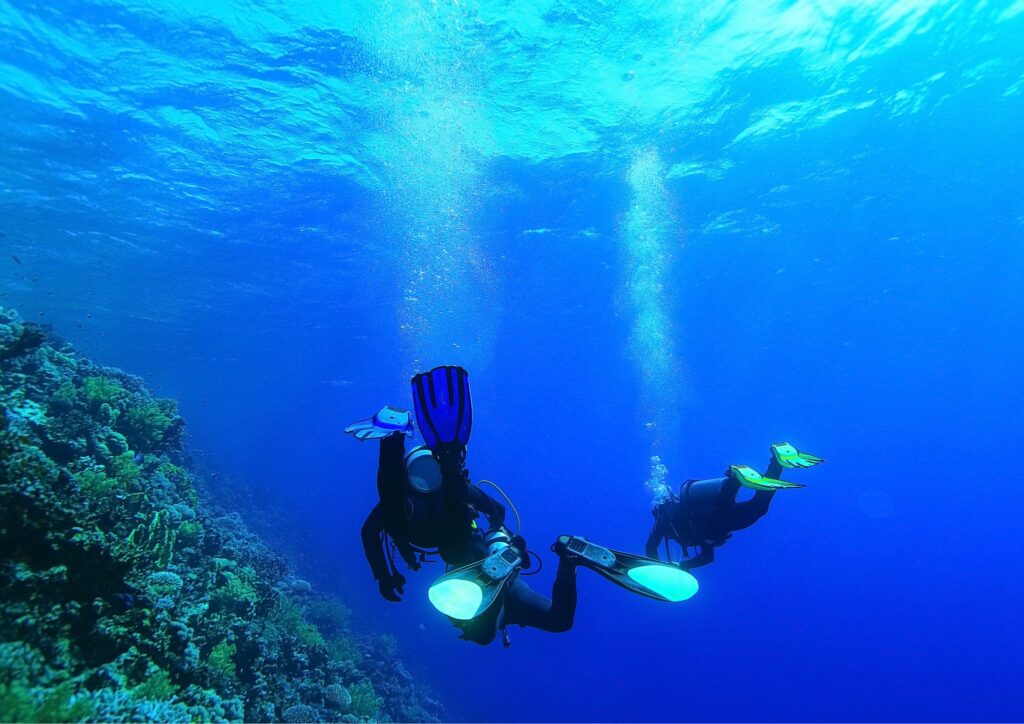Beneath the world’s bodies of water lies a hidden landscape teeming with vibrant life, eerie shipwrecks, and breathtaking coral formations. Let’s dive deeper into the five must-have basic scuba diving skills that can open your gateway to underwater exploration. The magic of the underwater realm can only be truly experienced through scuba diving. But to make the most of this thrilling activity, one must acquaint themselves with specific essential skills in Basic Scuba Diving.
Don’t Hold Your Breath: The Art of Breathing Underwater for Basic Scuba Diving
Scuba diving, an exhilarating activity filled with aquatic discoveries and underwater adventures, exposes us to an environment alien to our natural one. At the heart of this mesmerising underwater experience is a critical principle, ‘Don’t hold your breath.’ Though it might sound simple, it carries an immense significance in ensuring diver safety. During the dive, as you explore the marine world, your body undergoes a unique phenomenon. With each rise and dip corresponding to the water depth, the air volume in your lungs continuously expands and contracts.
This fluctuation is natural, but holding your breath disrupts this rhythm and can lead to a potential lung injury due to overexpansion. It is thus indispensable to adapt a smooth, ceaseless breathing rhythm, regardless of the thrills unfolding under the waves. Not only does this enhance the diving experience, but it also aids in maintaining the necessary oxygen circulation while avoiding any lung damage.

Equalise Early and Often: Maintaining Comfort and Preventing Barotrauma
A plunge into the deep waters introduces your body to a shift in the ambient pressure. As you descend further, the water pressure skyrockets, resulting in an unsettling discomfort often experienced in your ears. However, savvy divers utilise a technique known as ‘equalisation’ to handle this situation adeptly. Similar to yawning or swallowing, equalising involves gently blowing against your closed nostrils to compensate for the accumulating pressure around your ears.
But, in Basic Scuba Diving, remember the key is to ‘Equalise early and often’. Frequent equalisation from the beginning of your descent forestalls any uneasiness, allowing you to enjoy your dive without getting troubled by the changing pressure. Meanwhile, it mitigates the risk of barotrauma, a health hazard caused by pressure-induced damage to your body’s air-filled spaces like the middle ear or sinus cavities.
Clearing Your Mask: Visibility Matters
Imagine having a spectrum of colourful corals, friendly fishes, and intriguing sea creatures ahead of you but your vision is blurred by the water seeping into your mask! Distractions and discomfort caused by such situations can rob you of the immersive diving experience. Hence, ‘Clearing your mask’ is an indispensable skill for any diver. The concept entails gently breathing out through your nose while slightly uplifting your head, driving the water out from the mask’s bottom. Executing this helps maintain a clear view, allowing you to absorb the spectacular sights and continue engaging with the beautiful aquatic life undisturbed.
Clearing Your Regulator: Ensuring a Continuous Air Supply
Acquiring a continuous air supply is key for a successful and safe diving experience. However, during the Basic Scuba Diving dive, your regulator, a crucial instrument that controls the air supply, might dislodge or get water inside, interrupting your airflow. ‘Clearing your regulator’ is a paramount skill that helps in swiftly restoring your airflow. The process encompass exhaling through the regulator to forcefully expel the water out, or using the purge button to clear any water inside. Equipping yourself with this skill ensures a streamlined, uninterrupted air supply, which is integral not only for your comfort but also for your safety.
Neutral Buoyancy: The Balance Underwater
‘Neutral buoyancy’ – the expression sounds straightforward, but mastering it is as much of an art as it is science of basic scuba diving. It’s the state of feeling weightless under the water, a balance achieved by fine-tuning your buoyancy control device. This skill creates a state wherein you neither sink nor float, providing the sensation of effortless hovering underwater. Employing this technique gives you better manoeuvrability, reducing the chances of unnecessary exertion or fatigue. More importantly, acquiring this skill aids in preventing any incidental damage to the sensitive marine environment, making your dive not only pleasurable but also truly eco-friendly.
Make a Splash with These Essential Basic Scuba Diving Skills in Bali
The enchanting underwater realm waits to be explored. Mastering these five skills in Basic Scuba Diving: ‘Don’t hold your breath’, ‘Equalise early and often’, ‘Clear your mask’, ‘Clear your regulator’, and ‘Achieve neutral buoyancy’, are basic scuba diving skills, not only prepares you to face any underwater scenarios but also ensures a wonderful and safe diving experience. So, equip yourself with these essential skills, plunge into the depths, and let the magic of the underwater world amaze you.
Embarking on a Bali diving adventure requires more than just enthusiasm; mastering essential scuba diving skills is crucial to fully enjoying and navigating the underwater wonders. With Bali’s diverse dive sites, ranging from the serene coral gardens of Amed to the exhilarating drift dives of Nusa Penida, honing your buoyancy control is key to maintaining stability and avoiding damage to delicate marine ecosystems.
Efficient breathing techniques help conserve air and extend dive time, while a clear understanding of underwater navigation ensures you can confidently explore and return to your starting point. Skills in managing currents and executing safe ascents and descents are particularly important in Bali’s dynamic waters. Additionally, being adept at underwater communication and problem-solving enhances safety and enjoyment, allowing you to focus on the awe-inspiring sights around you. By equipping yourself with these essential scuba diving skills, you can make a splash in Bali diving, experiencing the vibrant marine life and stunning underwater landscapes to the fullest.

I love how this post highlights the importance of mastering basic scuba diving skills. It’s not just about having fun, but also about being safe and responsible in the water.
Hi Evelyn, thank you for sharing your thoughts! We’re glad to hear that our post resonated with you. Indeed, mastering basic scuba diving skills is crucial not only for a safe and enjoyable experience but also for respecting the marine environment. At Gill Divers, we prioritize diver education and safety above all else. If you have any questions or concerns about our Basic Scuba Diving course or would like to know more about our dive experiences in Bali, please don’t hesitate to reach out to us at Tel: +65 6734 9373 or Email: [[email protected]](mailto:[email protected]). We’d be delighted to assist you. Have a great day!
I completely agree with this post! As a beginner diver, I was initially overwhelmed by all the skills and techniques required. But once I mastered these basic scuba diving skills, it made a huge difference in my confidence and overall experience.
Hi Rahul, thank you for sharing your experience! We’re thrilled to hear that mastering the basic scuba diving skills has made a huge difference in your confidence and overall experience. At Gill Divers, we believe that proper training and knowledge are essential for a safe and enjoyable dive. If you have any questions or concerns about your diving skills or would like to learn more about our services, please don’t hesitate to reach out. We’re always here to help. Tel: +65 6734 9373, Email: [email protected]
This post is so informative! I had no idea that equalising early and often was such an important skill. Thanks for sharing this knowledge, it’s definitely going to help me improve my diving skills.
Thank you for sharing your thoughts, Nurul Huda! We’re thrilled to hear that the post was informative and helpful. Mastering equalisation early and often is indeed a crucial skill in Basic Scuba Diving, and we’re glad our article could help you learn something new. If you have any more questions or need further clarification on any of the skills mentioned, please don’t hesitate to reach out to us at Tel: +65 6734 9373 or Email: [email protected]. We’re always here to help.